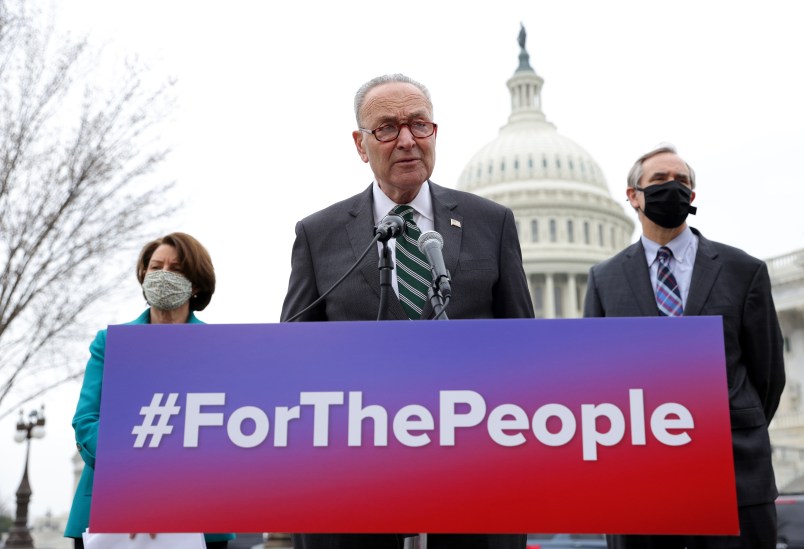While reconciliation, the debt ceiling and a looming government shutdown suck all the oxygen out of the Senate chamber, a small group of Democrats continues trying to forge a path for their voting rights bill to become law.
Sen. Tim Kaine (D-VA) told TPM that they plan to vote on a motion to proceed to the bill next week.
“We are engaging in discussions with Republicans to see whether we can get some but once that vote is taken, you know, then we can start to talk about next steps,” he said.
The Freedom to Vote Act was introduced last week, a revamped version of Democrats’ previous voting legislation tweaked to satisfy Sen. Joe Manchin (D-WV). He had qualms with its predecessor, the For the People Act, and Democrats see a united front as necessary to pushing the next issue — eliminating the filibuster, or at least carving out a voting rights exception, to actually get it passed.
The days since the bill’s unveiling have been devoted to giving Manchin time to win over 10 Republican votes for the bill — something that he insists, despite all available evidence, is possible.
The bill’s cosponsors have indulged him, knowing that any chance of Manchin changing his mind on the filibuster starts with an inability to recruit 10 Republicans to the cause — an outcome, the theory goes, that would demonstrate the necessity to Manchin of Democrats going it alone on the legislation. The cosponsors have even participated in some of the conversations with Republicans.
“We just met yesterday and Senator Manchin is continuing to seek out Republicans and meeting with them — I’ve talked to a few of them,” Sen. Amy Klobuchar (D-MN) told TPM Thursday. “Our focus was always to give him that time to talk to Republicans with help from some of us, and after that, we’ll go from there.”
Unsurprisingly, the conversations have not borne fruit.
Sen. Alex Padilla (D-CA) told TPM that while he’s tried, he has “yet to get a yes — a lot of talk, no action.”
“I’ve had some really good candid discussions with people who I would rank within that caucus as more likely to support it, but I’ve not yet had success,” Kaine said.
Sen. Raphael Warnock (D-GA) said that he’s “talking to everyone he can.” As TPM asked if he’d had any success in that endeavor while the elevator grilles in the Senate basement slid close, he smiled and shrugged.
The vast majority of the Democratic caucus and advocates alike have long hoped that a war of attrition-style approach would sway Manchin and fellow filibuster disciple Sen. Kyrsten Sinema (D-AZ) into changing their stance on the Senate rule. Both profess to be invested in voting rights legislation, so it’s become the tip of the anti-filibuster spear.
But as the months dragged on with no discernible change in their positions, the anti-filibuster contingent became panicky. Many are calling on President Joe Biden to get involved, the last untapped resource in changing the senators’ minds.
Kaine admitted that Democrats considered wrapping voting rights legislation into the sweeping reconciliation package, which would have let them sidestep the filibuster and avoid the need to recruit the mythical cooperative Republicans.
“We looked at it when we were writing the [budget] instruction,” Kaine sighed. “But we thought it’d be really hard to do.”







Don’t just “aim”.
Aim and fire.
It will be interesting to see how today’s reported results on the Arizona “audit” will change any of this debate.
Well surprising but not shocking, I will wait for TPM’s take before commenting further as it seems to be an example of rats jumping out of a sinking ship.
Yes, but they need to be fully loaded before firing can have the desired effect.
There is not enough attention on questioning designed to evoke Manchin’s desire–assuming their is–for carve-outs or talking filibusters.
To say “filibuster” without any mention of type is lame, to say the least
The base finding, of course, is that Biden won and Trump lost. But the rest of the report is padded out with other “findings” about purported problems with the AZ election system.
It will interesting to see which of these secondary “findings” survive inspection by actual election experts.